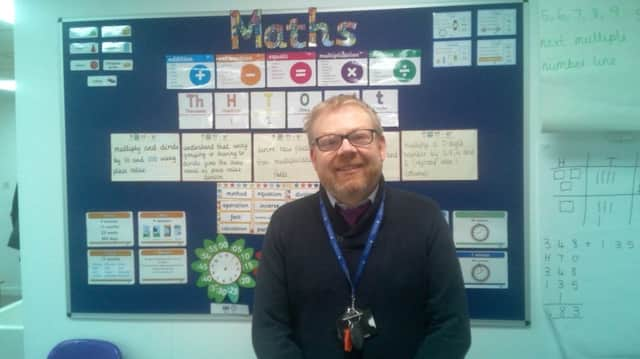Hastings teacher explains new maths curriculum and how it affects town’s schoolchildren


This World Maths Day (March 6) Simon Jupp, a year five teacher at Ark Castledown Primary Academy, explains the new system, why it’s being implemented and how, in his experience, children and teachers are finding the transition.
What is ‘mastery teaching’ in maths and how does it differ from the previous curriculum?
Advertisement
Hide AdAdvertisement
Hide Ad“Mastery teaching is about ensuring children really understand the subject as a whole, instead of simply learning ‘parrot fashion’ how to do sums to pass tests. Previously we pushed primary children through the curriculum quickly. We found lots of children knew how to do the things they were taught, but not why, so problems came in secondary when students had to tackle more complex maths, without fundamental understanding rooted in their mind.
“The new system reduces the number of concepts we teach at primary, but teaches them in a much deeper way – we want children to know a lot about a little to give them a solid foundation – so we’re constantly revisiting ideas we’ve taught earlier in the year to hammer things home.
“When I was a child, I was very good at maths and I used to naturally visualise problems – it wasn’t until I became a teacher that I realised that not all children did that. Maths mastery has a very strong emphasis on visual and physical learning in order to help children to understand why a sum works, or a problem is solved in a certain way, and how numbers work. What does ‘three’ actually mean? It can be three cows or three pencils; it’s what remains when you take two pounds from a fiver; it’s 12 slices of pizzas shared between four people.”
How is it being implemented and how have the children found it?
Advertisement
Hide AdAdvertisement
Hide Ad“It’s being implemented at different rates in different schools. At Ark Castledown, we wanted to roll it out as quickly across as many year groups as possible so we’re currently teaching it from years one to five.
“For me personally it’s been a really fantastic experience - we’ve been able to spend more time on each part of the syllabus which gives all children in the class a better chance of really getting to grips with each procedure. The more times we tackle the same problem from a variety of angles, the more chance we have of a child who naturally struggles clicking into gear and discovering their way of learning. At the same time, it gives those who are able a deep understanding.”
What have been the challenges?
“There are always challenges when adopting a new system. Of course, staff need to be trained which takes time, and is an ongoing process, but also the children need to adapt and Learn a slightly new system. In my personal experience, it hasn’t been too tumultuous. I used to be a science teacher, so I’ve always tried to bring a ‘wholistic’ set of real world examples into the primary maths classroom, so perhaps it was an easier transition for me.”
Why is maths important for primary school children?
“I really can’t emphasise enough how vital it is for primary school children to develop fundamental maths skills. These are the building blocks which are needed for success at secondary. “Everyone knows that getting a maths GCSE is an important qualification for further studying, career, etc, but, more than that, it’s a life skill which is used universally. I passionately believe that all children have the right to a good maths education.”
Advertisement
Hide AdAdvertisement
Hide AdWhat tips would you give to parents to improve their children’s maths?
“Parents are without doubt the single most important resource a teacher has to helping children with maths. The truth is that a lot of adults and parents actually struggle with maths themselves – it’s very common.
“If this is the case, we really encourage parents to avoid saying this like ‘I can’t do it, so you can’t do it’ – this has a very, very negative effect. Please, speak to your child’s teacher and they will be able to offer you support – if you persevere, you will be able to learn alongside your child which is an incredibly positive thing to do.
“We are actually hosting some parent/child workshops soon to teach maths in everyday scenarios, such as baking, cooking, shopping and days out. Using tangible, real world examples help to create a more relatable environment and, dare I say it, can actually make maths fun. Although I’m dreading learning how to bake!”
Primary and secondary schools in Hastings are being supported to develop a mastery approach to teaching maths by The Department For Education, The Sussex Maths Hub and the Hastings Opportunity Area.